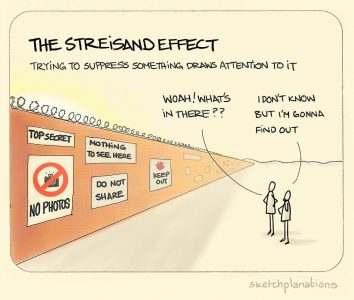
“Don’t waste words on people who deserve your silence. Sometimes the most powerful thing you can say is nothing at all.”
-Unknown
“If you see something, say something.”
“Stand up for yourself.”
“Use your voice, don’t be quiet.”
These slogans, and many similar messages, are being spread like wildfire.
Cancel culture has made it that one should bring attention to improper words and actions, and demand accountability for them.
On the surface this seems like a very good thing (when being applied at the correct time for egregious behaviors) but should one apply these principles automatically?
Despite the external pressure to use one’s voice, there are times when silence is actually the more preferable option.
This brings me to something called The Streisand Effect, named after Barbra Streisand and a decision that she probably wished she could revisit.
Barbra Streisand valued her privacy. She was appalled when pictures of her private mansion were posted online without her permission. (Note, these pictures were being shared to highlight erosion of the California coastline, they were not being shared with intent to violate the privacy of Barbra Streisand.)
Prior to her complaining about the picture, it was viewed six times, two of those views came from Streisand’s attorneys. After she complained about the pictures violating her privacy, views of the pictures soared to over 400,000 views.
In other words, the mere attempt to hide information ended up spreading that information much further and quicker than had Ms. Streisand opted to remain quiet.
What does this mean for us?
When we see something outrageous, something that demands that we take action, we need to take a deep breath and to see whether our action will be beneficial or detrimental. When someone with 45 followers on twitter posts something harmful/racist, do we really want to give this person the attention that they don’t yet have by registering a complaint?
Using our voice can be extremely helpful, given the correct situation. Yet there will be situations when using our voice will be counter-productive. Additionally there are times when silence will be constituted as an agreement and there will be times when it won’t.
As much as our emotion is telling us to take action, emotional decisions usually aren’t the best decisions in the long run. Take a moment, try to view the situation rationally and with a long term outlook.
Sometimes the best action is by taking no action at all.
___________
Yisroel Picker is a social worker living in Jerusalem. He has a private practice specializing in working with people of all ages helping them understand their own thought processes, enabling them to improve their level of functioning, awareness, social skills and more.
To speak with Yisroel about speaking at a child safety event or to discuss a personal case, email him at yisroel@ympicker.com
Follow Yisroel on LinkedIn here.
Follow Yisroel on Facebook here.



















